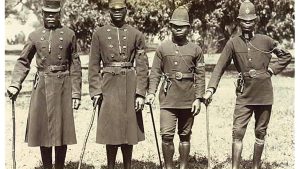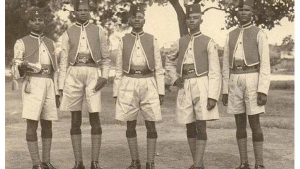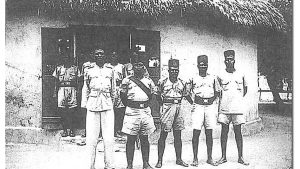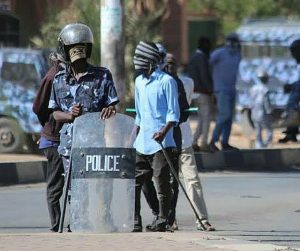History Of The Nigerian Police: The evolution, difficulties, and advancement throughout the history of the Nigerian Police Force are the subject of this blog post.
The Nigerian Police Force has been instrumental in upholding the law, preserving order, and safeguarding the nation’s population from the time of its founding during the colonial era until the present.
In this article, we’ll explore the long history of the Nigerian Police Force, looking at its beginnings, growth, difficulties, and triumphs.
See Also: Difference Between Custom and Tradition
History And Origin Of The Nigerian Police Force
The Nigerian Police Force’s origins can be traced to the colonial period, when Nigeria was governed by the British. In order to uphold peace and order in the colony of Lagos, the British government founded the first police force in Nigeria in 1861, known as the Lagos Police. The Lagos Police, which was in charge of maintaining law and order in the Lagos Colony, was primarily made up of British officers.
As the British colonial rule expanded to other parts of Nigeria, the need for a more organized police force arose. In 1894, the Royal Niger Company established the Niger Coast Constabulary, which was later merged with the Lagos Police to form the Southern Nigeria Police in 1906. The Southern Nigeria Police was responsible for policing the southern region of Nigeria, which comprised the present-day states of Lagos, Ogun, Ondo, Edo, Delta, Bayelsa, Rivers, and Akwa Ibom.

To preserve peace and order in the northern region of Nigeria, which included the modern-day states of Sokoto, Kebbi, Zamfara, Kaduna, Katsina, Kano, Jigawa, Bauchi, Yobe, and Borno, the British administration founded the Northern Nigeria Police in 1900.
The Nigerian Police Force’s principal responsibilities during the colonial era included upholding law and order, defending British interests, and quelling local uprisings against colonial control. Nigerians were mostly used as constables or other lower-ranking officials, while British officers held senior posts in the police force.
Recommended: Major Duties/Functions of the Local Government
Development Of The Nigerian Police Force
With the passage of time, the Nigerian Police Force underwent several significant changes in its structure, functions, and responsibilities. One of the key developments was the enactment of the Police Act of 1943, which established a unified police force for the entire country, bringing together the Southern Nigeria Police and the Northern Nigeria Police under a single command.

The Police Act of 1943 also introduced reforms in the recruitment, training, and promotion of police officers. It emphasized the need for a professional and disciplined police force that could effectively maintain law and order, protect life and property, and uphold the rule of law. The Act also provided for the establishment of a Police Service Commission to oversee the recruitment, training, and promotion of police officers, as well as to ensure their impartiality and integrity.
Nigeria advanced toward independence from British domination in 1958 and gained self-governance when it became a republic in 1963. The Nigerian Police organization reached a critical turning point in its history when it transitioned from a colonial organization serving the British government’s interests to a national institution serving Nigerians.
The Nigerian Police Force encountered many difficulties in the years following independence. The politicization of the police force, which previous administrations used to repress political dissent and keep control of the country, was one of the major problems. The country’s political environment had a significant impact on the police force, which contributed to corruption, the abuse of authority, and the decline in public confidence.
Despite these challenges, the Nigerian Police Force made progress in terms of capacity-building, modernization, and professionalization. In 1964, the Police College was established in Ikeja, Lagos, to provide training to police officers and improve their skills and knowledge. The police force also started to recruit more Nigerians into higher-ranking positions, and the Nigerian Police Force gradually became more representative of the diverse population of Nigeria.
In 1979, the Nigerian Police Force underwent another major reform with the enactment of the Police Act of 1979. This Act further emphasized the need for professionalism, accountability, and respect for human rights within the police force. It also introduced measures to improve the welfare and working conditions of police officers, including provisions for their housing, healthcare, and retirement benefits.
The Nigerian Police Force also played a significant role in maintaining peace and security during various periods of political instability in Nigeria. For instance, during the Nigerian Civil War (1967-1970), the police force played a crucial role in maintaining law and order and ensuring the safety of civilians. The police force also played a key role in tackling crime, addressing communal conflicts, and maintaining peace in various parts of the country.
Must Read: Three Arms of Government and Their Functions
Challenges And Roadblocks Faced By The Nigerian Police Force
Despite the progress made by the Nigerian Police Force over the years, it has faced several challenges that have impacted its effectiveness and reputation. Some of the major challenges faced by the Nigerian Police Force include:
1. Corruption: Corruption has been a pervasive problem within the Nigerian Police Force. Reports of bribery, extortion, and embezzlement have tarnished the image of the police force and eroded public trust. Corruption has not only undermined the integrity of the police force but has also hindered its ability to effectively combat crime and maintain law and order.
2. Lack Of Adequate Resources: The Nigerian Police Force has often faced challenges in terms of inadequate funding, manpower, and equipment. Police officers often lack basic resources such as vehicles, firearms, and communication equipment, which impede their ability to respond effectively to crime and maintain security.

Additionally, the shortage of trained personnel has led to heavy workloads and long working hours for police officers, affecting their efficiency and morale.
3. Poor Training And Professional Development: Training and professional development are crucial for police officers to effectively carry out their duties. However, there have been concerns about the quality and adequacy of training provided to police officers in Nigeria.
Inadequate training in modern policing techniques, investigative skills, and human rights has affected the professionalism of the police force.
4. Political Interference: The Nigerian Police Force has often been subjected to political interference, with the police being used as a tool by successive governments to suppress political opposition and advance their agendas.
This has undermined the independence and impartiality of the police force, leading to a loss of public trust.
See Also: Know Your Strength and Weakness
5. Ethical Issues: Ethical issues, such as abuse of power, excessive use of force, and lack of accountability, have been persistent challenges within the Nigerian Police Force.
Reports of police brutality, extortion, profiling, extrajudicial killings, and human rights abuses have been a cause for concern, and have often resulted in public outcry and protests. A classical example of the fallout of this was the #ENDSARS protests that rocked the country in 2020.
6. Lack Of Public Trust and Confidence: Building public trust and confidence in the police force is crucial for effective law enforcement. However, issues such as police brutality, excessive use of force, and lack of accountability have eroded public trust in the Nigerian Police Force, making it difficult to gain the cooperation and support of the communities they serve.
7. Community Policing: Community policing, which involves building trust and cooperation between the police and the communities they serve, has been lacking in Nigeria.
The concept of community policing, which promotes a partnership between the police and the community in preventing and solving crimes, has not been fully embraced, leading to a disconnect between the police and the communities they serve.
Local police infrastructure like Ebubeagu and Amotekun has had several altercations with members of the Nigerian Police force.
8. High Crime Rate: Nigeria faces significant challenges in addressing the high crime rate in the country, including organized crime, terrorism, kidnapping, and cybercrime.
The Nigerian Police Force often faces operational challenges in effectively combating these crimes, including limited resources, inadequate training, and lack of specialized units.
See Also: Differences Between Acquittal And Discharge
Achievements Of The Nigerian Police Force
Despite the challenges faced, the Nigerian Police Force has also achieved notable successes in its history. Some of the achievements of the Nigerian Police Force include:
1. Crime Prevention and Law Enforcement: The Nigerian Police Force has played a significant role in preventing and combating crime in Nigeria. Police officers have made numerous arrests and successfully prosecuted criminals involved in various crimes, including armed robbery, kidnapping, fraud, and cybercrime.
2. Maintenance Of Peace and Security: The Nigerian Police Force has been instrumental in maintaining peace and security during times of political instability, communal conflicts, and civil unrest. Police officers have worked tirelessly to restore peace and order in various parts of the country, often putting their lives at risk.

3. Aiming To Promote Gender Equality: In its ranks, the Nigerian Police Force has worked to advance gender equality. The police force has worked to boost the number of women in its workforce over the years by, among other things, encouraging gender-sensitive policing techniques and bringing more women into the police school.
4. International Peacekeeping Missions: The Nigerian Police Force has also contributed to international peacekeeping efforts. Nigerian police officers have been deployed to other countries as part of United Nations (UN) peacekeeping missions, where they have worked alongside police officers from other countries to maintain peace and security in conflict zones.
5. Capacity Building And Professional Development: The Nigerian Police Force has invested in capacity building and professional development programs for its officers.
This includes training programs on modern policing techniques, investigative skills, human rights, and community policing, aimed at enhancing the professionalism and effectiveness of the police force.
6. Use Of Technology: The Nigerian Police Force has also embraced the use of technology to improve its operations. This includes the deployment of technology-driven initiatives such as the use of digital forensics, fingerprint identification, and other cutting-edge tools to aid in crime detection and investigation.

7. Collaboration With Other Agencies: The Nigerian Police Force has collaborated with other law enforcement agencies and international partners in the fight against crime. This includes partnerships with agencies such as the Economic and Financial Crimes Commission (EFCC), the National Drug Law Enforcement Agency (NDLEA), and Interpol, among others, to tackle organized crime, drug trafficking, and other transnational crimes.
Recommendation: Most Developed Countries In The World 2023
Reforms And Efforts For Improvement
Recognizing the challenges faced by the Nigerian Police Force, there have been several reform efforts aimed at improving its effectiveness, professionalism, and accountability. Some of the key reforms and efforts for improvement in recent years include:
1. Police Act Of 2020: In 2020, the Nigerian government passed the Police Act, which aimed to address some of the long-standing issues within the police force. The new Act seeks to enhance transparency, accountability, and professionalism in the Nigerian Police Force. It establishes a Police Service Commission to oversee the recruitment, promotion, and discipline of police officers, as well as a Police Trust Fund to improve the welfare and working conditions of police officers.
2. Community Policing: The Nigerian Police Force has been implementing community policing initiatives to foster closer ties between the police and the communities they serve. This involves building trust, engaging with communities, and involving them in the decision-making processes of policing, with the aim of enhancing police-community relations and improving the effectiveness of policing efforts.
3. Training And Professional Development: Efforts have been made to improve the quality and adequacy of training provided to police officers. This includes training programs on modern policing techniques, human rights, and investigative skills, as well as leadership development programs to enhance the professionalism of police officers.
4. Measures To Prevent Corruption: Efforts have been made by the Nigerian Police Force to combat corruption within its ranks. The formation of the Police X-Squad, whose job it is to look into claims of corruption and other types of malfeasance among police officers, is one example of this.
Additionally, steps have been taken to increase the accountability and openness of police payroll management, including the implementation of the Integrated Payroll and Personnel Information System (IPPIS).
5. Welfare And Working Conditions: Efforts have been made to improve the welfare and working conditions of police officers. This includes provisions for better housing, healthcare, and retirement benefits, as well as the procurement of modern equipment and infrastructure to support police operations.
6. Strategic Partnerships: The Nigerian Police Force has sought strategic partnerships with other law enforcement agencies and international partners to enhance its operational capabilities.
This includes partnerships for training, information sharing, and technical assistance in areas such as counterterrorism, intelligence gathering, and cybercrime prevention.
Recommended: History Of The Nigerian Army (With Pictures)
Facts About The Nigerian Police Force
1. The Nigerian Police Reform Bill: This is the latest attempt by the Nigerian government to curb the many lapses of the Nigerian Police Force in performing its duties. It passed the mandated reading in the National Assembly and was signed into law on September 16, 2020 by President Muhammadu Buhari.

The goal was to create a more effective police force through accountability and transparency. It was also meant to tackle the challenges the force was facing. Sadly, less than a month later, Nigerian youths would take to the streets demanding the disbandment of a particular squad of the Nigerian Police Force.
2. The End of SARS and the Beginning of SWAT: Nigerian youth took to the streets in Lagos, and other states across the country, demanding the dismantling of the Special Anti-Robbery Squad (SARS). They accused this squad of different heinous crimes including, rape, extortion, torture, and murder.

After a bloody encounter at the Lekki Toll gate, the Government seemed to listen to the cries of the people. SARS was dismantled and SWAT was created to replace the body as the country’s tactical unit.
3. The Nigerian Police Force Once Recruited Underage Officers: Presumably, this was an attempt at expansion by the then head of stature Olusegun Obasanjo. He reduced the recruitment age from 19 to 17. He claimed the expansion would help for a more functional Nigerian Police Force. The attempt failed and the recruitment age was taken back up to 19.

4. The Nigerian Police Force Makes Use of 5 Types of Vehicles
You probably mostly see them in the Toyota Hilux. However, the Nigerian Police also works with 4 other types of vehicles.
a. The Bell 412: A utility helicopter
b. The Terradyne Gurkha: A tactical armoured car.
c. The Cessna Citation Excel: A business jet.
d. The Asisguard Songar: An unmanned drone
See Also: Salary Of Lawyers In India
Conclusion
The history of the Nigerian Police Force reflects a complex and evolving journey that has seen both achievements and challenges. From its colonial origins to its current role as a law enforcement agency tasked with maintaining peace and order in a diverse and dynamic country, the Nigerian Police Force has played a significant role in the history and development of Nigeria.
Over the years, the Nigerian Police Force has made efforts to adapt to changing societal and technological landscapes, tackle crime, promote gender equality, and improve its professionalism and accountability. However, there are persistent challenges that continue to hinder its effectiveness, including inadequate resources, poor working conditions, corruption, lack of public trust, and high crime rates.
Efforts towards reform and improvement, such as the Police Act of 2020, community policing initiatives, training and professional development programs, anti-corruption measures, welfare and working conditions, and strategic partnerships, are steps in the right direction.
However, sustained efforts and commitment are needed to overcome the challenges and transform the Nigerian Police Force into a more efficient, accountable, and trusted institution that can effectively fulfill its mandate of ensuring the safety and security of the Nigerian people.
As Nigeria continues to strive for a brighter future, it is crucial to recognize the importance of a professional and effective police force that upholds the rule of law, protects human rights, and fosters trust and confidence among the communities it serves.
With concerted efforts from the government, police leadership, officers, and the public, the Nigerian Police Force can continue to evolve and contribute positively to the nation’s progress.

Edeh Samuel Chukwuemeka, ACMC, is a lawyer and a certified mediator/conciliator in Nigeria. He is also a developer with knowledge in various programming languages. Samuel is determined to leverage his skills in technology, SEO, and legal practice to revolutionize the legal profession worldwide by creating web and mobile applications that simplify legal research. Sam is also passionate about educating and providing valuable information to people.